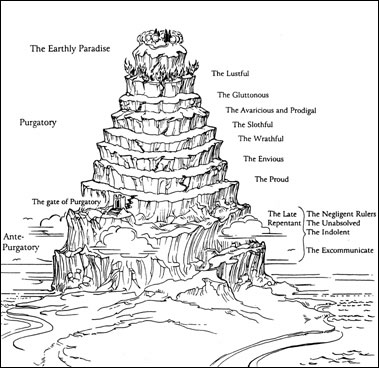"Remember, the three most powerful narratives on the planet are narratives of religion, narratives of nation, and narratives of ethnicity/race. You cannot afford to forfeit that territory by talking about economics or the Civil Rights Act of 1964. Don't be afraid to be Christian ministers. If you don't use the Christian narrative to define reality for your people, then someone else will define reality for them with a different narrative."
- Eboo Patel, seminary professor and Muslim.
Tuesday, April 13, 2010
Thursday, March 18, 2010
Purgatory Reflections, 3.15.10
Our first "Reflections from Purgatory" met my expectations of our learning community and left me thirsty for more. We reflected upon a book summary of Reggie McNeal's The Present Future and an article by by Joseph Myers, Cultural Tectonic Plate Shift. More time was spent on McNeal's book which invites the reader into considering six new realities. Here are some of the questions I noted that were raised by our discussion:
How do you formalize belonging?
Allison posed this as we agreed with McNeal that while a "club membership" mentality of church is repulsive to most, the need for commitment is not. If not "membership" then what? How does the faith community (including Urban Skye) invite dedication to the community?
What is the role of clergy?
If there is an expectation for those who choose to belong, what is the expectation for the clergy? Our modern church model is that those who belong finance the work of the clergy. That model is less sustainable than ever begging more questions about clergy roles and financing. I've long believed that everyone wants a "pastor" in their life at certain times, but when we loose ourselves from the modern church model we are forced to rethink what we offer, how and where we offer it, and how this is financed. (Sorry to keep bringing up money but it's foremost in my mind for all of us these days). Aram brought up his sense that the younger generation would see a clergy "calling" as a gig more than a career. How does that play into the discussion?
Do we still need "sacred space" that is set apart as sacred?
McNeal believes the culture is searching for sacred space (vs modern churches that build rec centers). I thought of Urban Skye and what kind of need might we have for dedicated space. The Celtic Way had dedicated space but also made sacred their ordinary space.
Where do we find mutual accountability?
This was in McNeal's discussion on apostolic leadership where he mentions relationships that "support mutual accountability, the capacity to challenge each others biases and assumptions..." The Reformed tradition of what makes a true church includes the category of "church discipline." Regardless of the language, the need for a community that challenges biases and assumptions seems crucial for personal and corporate growth. What do you do with this regarding your life or Urban Skye?
Are spiritual enough for the culture?
This was raised by McNeal and highlighted by Aram. It is such a strong statement. The one time I faced the ire of my superiors at my old job was when I questioned the organization's spirituality. How can we guide others into a deeper spirituality? Can we do this outside the community of faith as well as inside?
Sorry, I've got no questions from Joseph's wonderful article. I'll leave that to you.
How do you formalize belonging?
Allison posed this as we agreed with McNeal that while a "club membership" mentality of church is repulsive to most, the need for commitment is not. If not "membership" then what? How does the faith community (including Urban Skye) invite dedication to the community?
What is the role of clergy?
If there is an expectation for those who choose to belong, what is the expectation for the clergy? Our modern church model is that those who belong finance the work of the clergy. That model is less sustainable than ever begging more questions about clergy roles and financing. I've long believed that everyone wants a "pastor" in their life at certain times, but when we loose ourselves from the modern church model we are forced to rethink what we offer, how and where we offer it, and how this is financed. (Sorry to keep bringing up money but it's foremost in my mind for all of us these days). Aram brought up his sense that the younger generation would see a clergy "calling" as a gig more than a career. How does that play into the discussion?
Do we still need "sacred space" that is set apart as sacred?
McNeal believes the culture is searching for sacred space (vs modern churches that build rec centers). I thought of Urban Skye and what kind of need might we have for dedicated space. The Celtic Way had dedicated space but also made sacred their ordinary space.
Where do we find mutual accountability?
This was in McNeal's discussion on apostolic leadership where he mentions relationships that "support mutual accountability, the capacity to challenge each others biases and assumptions..." The Reformed tradition of what makes a true church includes the category of "church discipline." Regardless of the language, the need for a community that challenges biases and assumptions seems crucial for personal and corporate growth. What do you do with this regarding your life or Urban Skye?
Are spiritual enough for the culture?
This was raised by McNeal and highlighted by Aram. It is such a strong statement. The one time I faced the ire of my superiors at my old job was when I questioned the organization's spirituality. How can we guide others into a deeper spirituality? Can we do this outside the community of faith as well as inside?
Sorry, I've got no questions from Joseph's wonderful article. I'll leave that to you.
Subscribe to:
Posts (Atom)
